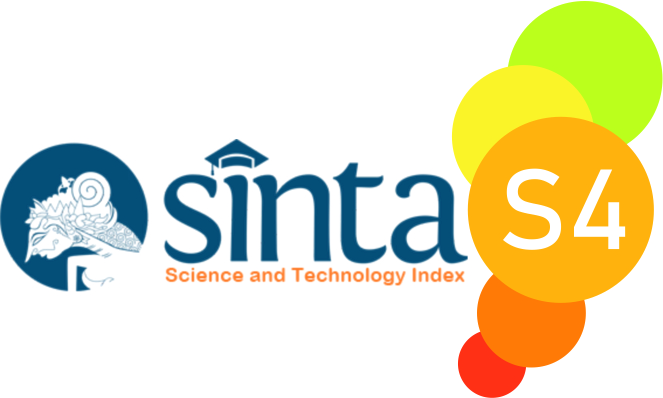Challenges and Futures of Ubiquitous Learning in Teaching English as a Foreigh Language
Abstract
This research aims at analyzing the challenges and the potential futures of the implementation of ubiquitous learning in teaching English as a foreign language (TEFL) in Indonesian context. This study employed descriptive qualitative research design with observation and interview as the data collection techniques. The samples of this research participants were 50 bachelor degree students majoring in English Education who were chosen through random sampling technique. After the data were attained, they were analyzed to answer the research questions of what challenges and futures of ubiquitous learning in Indonesian TEFL context were. The research findings presented that three major challenges in the implementation of ubiquitous learning in TEFL were technical problems (internet connection-related problems) which took 50% of the concerns, devices operating competence which had 30% of the attentions, and students’ attitude which had 20% of the problems. About the futures of ubiquitous learning in TEFL context, the participants testified that ubiquitous learning could be an excellent alternative to study from anywhere and at any time (40%), 30% suggested technical readiness to optimize the learning outcome, the other 20% thought that Indonesian students were not ready for the implementation of ubiquitous learning, and another 10% stayed neutral to the option. These findings contribute to fill the gap of the controversies of ubiquitous learning implementation. It is suggested that future researchers took deeper examination related to this topic.
References
Bashir, A., Bashir, S., Rana, K., Lambert, P., & Vernalis, A. (2021). Post-COVID-19 Adaptations; the Shifts Towards Online Learning, Hybrid Course Delivery, and the Implications for Biosciences Courses in the Higher Education Setting. Frontiers in Education, 6:711619.
Bazimaziki, G. (2020). Challenges in using ICT Gadgets to cope with effects of COVID-19 on Education: A short survey of online teaching Literature in English. Journal of Humanities and Education Development (JHED), 2(4), 299-307.
Beluce, A. C., & Oliveira, K. L. D. (2015). Students’ motivation for learning in virtual learning environments. Paidéia (Ribeirão Preto), 25(60), 105-113.
Bisht R.K., Jasola, S., & Bisht, I.P. (2020). Acceptability and challenges of online higher education in the era of COVID-19: A study of students’ perspective. Asian Education and Development Studies, (ahead of print).
Clarin, A.S. & Baluyos, E.L. (2022). Challenges Encountered in the Implementation of Online Distance Learning. EduLine: Journal of Education and Learning Innovation, 2(1), 33-46.
Fansury, A.H., Januarty, R., Rahman, A.W., & Syawal. (2020). Digital Content for Millenial Generations: Teaching the English Foreign Language Learner on Covid-19 Pandemic. Journal of Southwest Jiaotong University, 55(3), 1-12.
Fawaid, F.N., Hieu, H.N., Wulandari, D. I. R. (2021). Penggunaan Bahasa Gaul Pada Remaja Milenial di Media Sosial. Jurnal Literasi, 5(April), 64–76.
Harackiewicz, J. M., Smith, J. L., & Priniski, S. J. (2016). Interest matters: The importance of promoting interest in education. Policy insights from the behavioral and brain sciences, 3(2), 220-227.
Hwang, G.J., Chu, H.C., & Lai, C.L. (2017). Prepare your own device and determination (PYOD): A successfully promoted mobile learning mode in Taiwan. International Journal of Mobile Learning and Organization, 11(2), 87-107.
Kramarski, B. (2018). Teachers as agents in promoting students' SRL and performance: Applications for teachers' dual-role training program. Retrieved on August 10th, 2022 from https://psycnet.apa.org/record/2017-45259-015.
Lai, C.L., & Hwang, G.J. (2015). High school teachers’ perspectives on applying different mobile learning strategies to science courses: The national mobile learning program in Taiwan. International Journal of Mobile Learning and Organisation, 9(2), 124–145.
Lemay, D.J., Bazelais, P., & Doleck, T. (2021). Transition to online learning during the COVID-19 pandemic. Computers in Human Behavior Reports, 4: 100130.
Li, C. & Lalani, F. (2020) The COVID-19 Pandemic has Changed Education Forever. This is How. [Online] Retrieved August 1st, 2022, from: https://www.weforum.org/agenda/2020/04/co.
Malar, J.H., Venkatraman, R., & Monica, J.A. (2019). The English Vocabulary using Ubiquitous Learning System. International Journal of Innovative Technology and Exploring Engineering (IJITEE), 8(12), 548-552.
Sahu, P. (2020). Closure of Universities Due to Coronavirus Disease 2019 (COVID-19): Impact on Education and Mental Health of Students and Academic Staff. Cureus, 12(4), e7541.
Siddiquah, A., & Salim, Z. (2017). The ICT facilities, skills, usage, and the problems faced by the students of higher education. EURASIA Journal of Mathematics Science and Technology Education, 13(8), 4987- 4994.
United Nations Educational, Scientific, and Cultural Organization. (2020). Education: From disruption to recovery. [Online] Retrieved August 10th, 2022, from: https://en.unesco.org/covid19/educationresponse.
Vilanova, R., Dominguez, M., Vicario, J., Prada, M. A., Barbu, M., Varanda, M. J.,& Paganoni, A. (2019). Datadriven tool for monitoring of students performance. IFAC-PapersOnLine, 52(9), 16 5-170.
Wickramanayake, L., & Jika, S. M. (2018). Social media use by undergraduate students of education in Nigeria: A survey. The Electronic Library, 36(1), 21-37.
Yunanda, F., Nuari, D., Panjaitan, K.A.B., Renanta, F.W. (2022). The Analysis of Local Terms on social media of Indonesian Teenagers. Journal of English Language and Pedagogy, 5(1), 1-9.
Copyright (c) 2022 Hernina Dewi Lestari, Suhartatik Suhartatik

This work is licensed under a Creative Commons Attribution-ShareAlike 4.0 International License.

Journey: Journal of English Language and Pedagogy by http://ejurnal.budiutomomalang.ac.id/index.php/journey/index is licensed under a Creative Commons Attribution-ShareAlike 4.0 International License.






